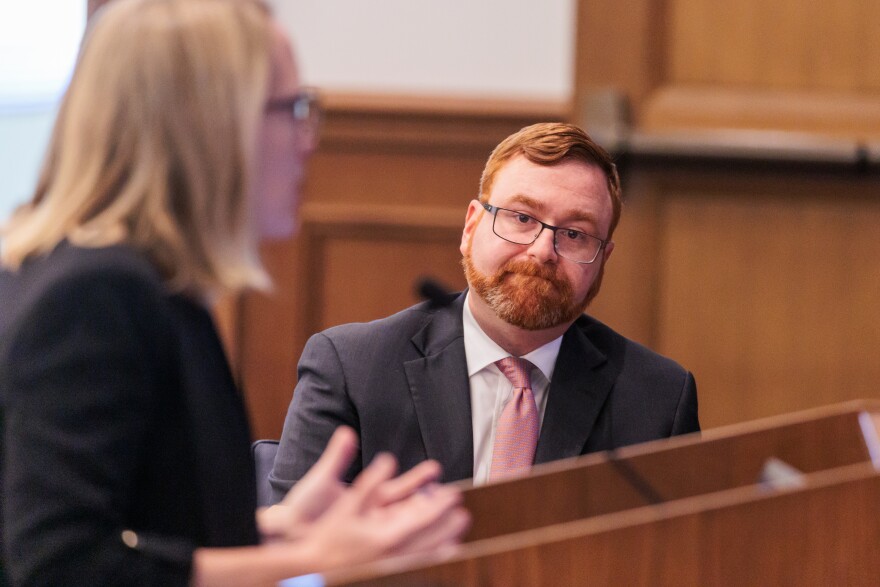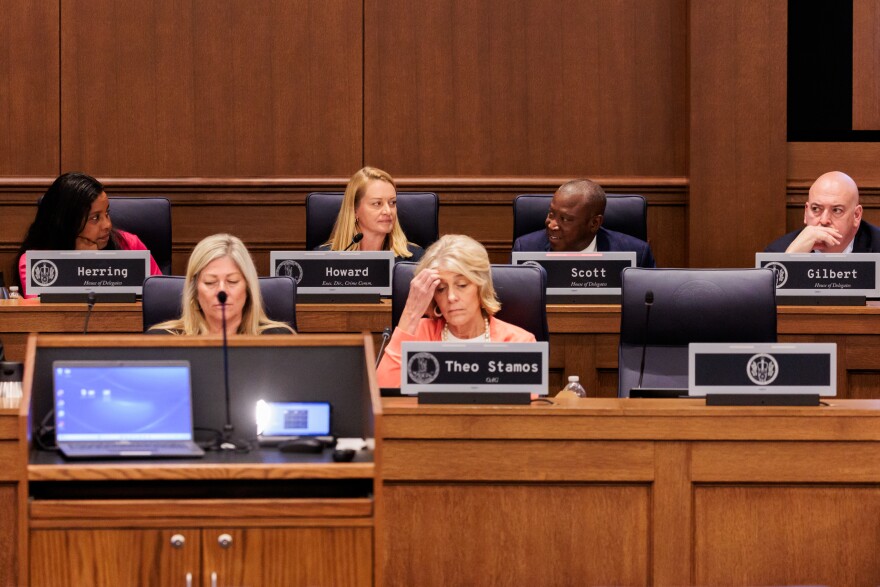Over the past year, the Virginia State Crime Commission has been reviewing criminal cases involving former lab analyst Mary Jane Burton to determine the number of people impacted by her work.
Now the commission is recommending a deeper review of her cases.
The General Assembly ordered the first study earlier this year following the release of the VPM podcast Admissible: Shreds of Evidence — which called into question the quality and accuracy of Burton’s lab work.
That review is still underway; Crime Commission staff have so far confirmed that 1,006 people were convicted in cases Burton analyzed – including 66 people who are still incarcerated, 231 who have since died, and eight who were executed.
About 2,700 cases have yet to be reviewed.
On Tuesday, the commission recommended convening a panel of legal and forensic experts to review about 250 of Burton’s cases to determine if a “pattern of misconduct” can be established.
Del. Charniele Herring (D–Alexandria), majority leader for Virginia’s House of Delegates and chair of the Crime Commission, said she gets a lump in her throat every time she sees the number of people convicted whose evidence was analyzed by Burton.
She thinks further review of Burton’s work — and potential legislative changes — are warranted to ensure more innocent people were not wrongfully convicted.
“The number of executions… it weighs heavy,” Herring told VPM News. “I'm glad we got rid of the death penalty in Virginia, because people can make mistakes, or intentionally falsify evidence.”
According to a presentation Tuesday by commission attorney Jacob Lubetkin, a more substantive review could help inform whether deceased defendants’ next of kin should be notified and whether a review of serologists trained by Burton should be conducted.

All 66 still-incarcerated individuals whose evidence was evaluated by Burton have been sent a letter by the Department of Forensic Science about their right to request that evidence in their cases be re-tested. According to the Crime Commission, two-thirds of those are Black and all are male.
DFS currently plans no further outreach to individuals who are still incarcerated, though the Innocence Project at the University of Virginia School of Law has convened a group of pro bono lawyers willing to help represent them if requested.
There are also no current plans to notify — or attempt to identify — next of kin in cases in which the defendant has died.
Amy Jenkins, lead attorney for DFS, said in a recent meeting she doesn’t “feel like there is any kind of remedy for next of kin” under current law — which only allows the defendant to request re-testing, not family members.
“During the course of the General Assembly session, we may come back and revisit the issue if they open it up,” Jenkins said.
Juliet Hatchett, director of the UVA Law Innocence Project, said that seems like an accurate interpretation of current law.
Sarah Martin said not notifying next of kin would be wrong. She’s still seeking closure, since the man convicted of killing her brother in 1975 was exonerated earlier this year.
“Their family needs to know,” Martin said, tearing up.
Her family recently had to process the fact that Marvin Grimm Jr., the man initially convicted of killing 3-year-old Christopher Harper, is innocent. Grimm was issued a Writ of Actual Innocence in June.
Martin worries that there could be other people whose cases were handled by Mary Jane Burton who were wrongly convicted and have since died. Burton herself died in 1999.
It was the Grimm case combined with the misconduct allegations raised in the Admissible podcast that convinced DFS to do a deeper review of Burton’s case files.
Burton’s lab work in the 1975 case concluded there was semen in Harper’s mouth, which was later determined to have been an incorrect result.
The state crime lab’s serologist also used a since-debunked form of hair analysis — involving hairs found on Grimm’s clothing and in his car — to determine that all the hairs found belonged to Christopher Harper. It was later determined that those hairs came from multiple people, but not Harper.
Grimm was convicted and given two life sentences, plus 10 years, in 1976.
Mary Kelly Tate, founding director of the Institute for Actual Innocence at the University of Richmond School of Law, started reviewing Grimm’s case in 2007 and quickly realized that it was “marked with extraordinary deficiencies.”
Tate told VPM News the commonwealth has a compounding problem: unreliable science and an unreliable scientist. Beyond just notifying people, she said testing or re-testing should be done on any available DNA in all cases Burton handled that resulted in a conviction.
Tate said because the state knows that there’s “this level of either incompetence or bad faith, it is incumbent on the sovereign to do a thorough reexamination of every case touched by the individual whose competence or good faith has strongly come into question.”
912 of the 1,006 people convicted in Burton-handled cases already had DNA in their cases tested in a bulk post-conviction review from the early 2000s.
So far, the state has not ordered additional DNA testing for any of these 1,006 cases except three that officials just realized were missed in that post-conviction review. Those cases are currently undergoing DNA testing.
Tate said she thinks there’s already enough evidence to indicate a systemic problem with Burton’s work — and said it’s her hope that the Legislature could act soon.
“It's my opinion that the less incrementalism and more urgency that is shown, the better,” Tate said.

Several state lawmakers who sit on the Crime Commission told VPM News they think these additional steps are necessary, including legislative changes.
State Sen. Scott Surovell (D–Fairfax), vice chair of the commission, said the family members of deceased defendants whose cases were handled by Mary Jane Burton should be notified. Additionally, he said a review of lab work completed by Burton-trained analysts should also be done.
“I think we need to make sure that we've looked at everybody who is potentially involved in Mary Jane Burton’s misdeeds to make sure that we're capturing everybody,” Surovell said. “The worst thing the state can do is lock up somebody or — God forbid — execute someone who was completely innocent.”
House Minority Leader Todd Gilbert (R–Shenandoah) agreed that a deeper review of Burton’s cases should be done and said people having their cases reviewed shouldn’t have to “bear any financial burden” for it.
“These types of misdeeds certainly undermine public trust in our system,” Gilbert told VPM News.
State Sen. L. Louise Lucas (D–Portsmouth) said she thinks Burton’s work is the “most criminal thing” that she’s ever heard someone who was employed by the state do.
“All of what she did with these analyses caused so much harm to the state,” Lucas said. “People have died, probably innocent people. We have people incarcerated, probably innocent people, all because of Burton’s work.”



